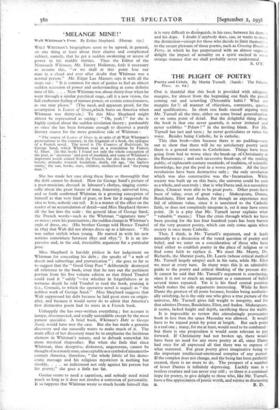THE PLIGHT OF POETRY
ONE is thankful that this book is proVided with adequate margins, for almost from the beginning one findi the pencil coming out and scrawling (Detestable habit ?: What are margins for ?) all manner of objections, comments, queries and qualifications. In short One finds oneself arguing with Mr. Turnell all the time, either on some broad generalisatien or on some point of detail. But the delightful thing about the book is that one never quarrels, is never irritated" and never scribbles " Psha* ! " in the inviting blank. For Mr. Turnell has tact and taste ; he never gesticulates or raises his voice. Besides being Catholic, he Is catholic.
This slim book—slim because there is no padding—sets out to show that there will be no satisfactory poetry until there is a -general return to Catholicism. Things have been going from bad to worse since the break-Up of Christianity at the Renaissance ; and each successive break-up, of the reading public, of eighteenth-century standards, Of tradition, of scientific knowledge, has put the poet in a worse position. All the latet revolutions have been destructive only ; the only revolution which was also constructive was the 'Incarnation. While society was built Up on this basis, the universe could be seen as a Whole, and seen truly ; that is why Dante and, in a secondary place, Chaueer were able to be great poets. Other poetshave been of value, even of great value ; ShakesPeare, Donne, Baudelaire, Eliot and Auden, for though an 'experience may fail of ultiniate value, since it is unrelated to the Catholic faith, or does not completely integrate it, yet it may have some point. (It is a pity that Mr. Turnell never explains what " Valitable " means.) Thus the crisis through which we have been passing for the last fOtir hundred years has been barren of the very greatest poetry, which can only come again ,when society is once more Catholic.
That, I think, is Mr. Turnell's argument, and it leads naturally to a discussion of the vexed question of poetry and, belief, and we enter on a consideration of those who have tried either to establish poetry in the Wade' of religion or to find some faith to replace it. We meet Mr. MuiTy; Dr. Richards, the Marxist 'poets, Dr. Leavis (whose critical method Mr. Turnell largely adopts) each in his turn, while Mr. Eliot we meet it every turn. In many ways this is an admirable guide to the poetry and critical thinking of the present day. It cannot be said that Mr. Turnell's argument is convincing, since it is not so much an argument as a statement of belief several times repeated. Yet it is his fixed central position which makes the side arguments interesting. While he finds Dante the greatest of all poets because, besides being aesthetic- ally satisfying, he is the only one who gives a true picture of the universe, Mr. Turnell- gives full weight to integrity, and for that admires Donne, Baudelaire, Eliot, and Auden. Shakespeare, it seems, lacked height and depth, sacrificing these for width.
It is impossible to review this stimulatingly provocative book in less than the space Macaulay was allowed. It would have to be argued point by point at length. But each point is a real one ; many, for me at least, would need to be combated : but there is one proposition it would seem relevant to put forward. If Christianity had not broken up, there would have been no need for any more poetry at all, since Dante had once for all expressed all that there was to express of what mattered. For great poetry gives imaginatiVe being to the important iritellecnial-emotional complex of any period. If the complex does not change, and the being has been perfectly created, there is no more to do. The prospect of a number of lesser Dantes is infinitely depressing. LUckily man is a reatless creature and can never stay still ; so there is a continual hope for pcietry, to give delight to those who, like Mr. Turnell,
have a fine appreciation of poetic worth, andrejoieeln discussing . . _ _
it. P.






































 Previous page
Previous page